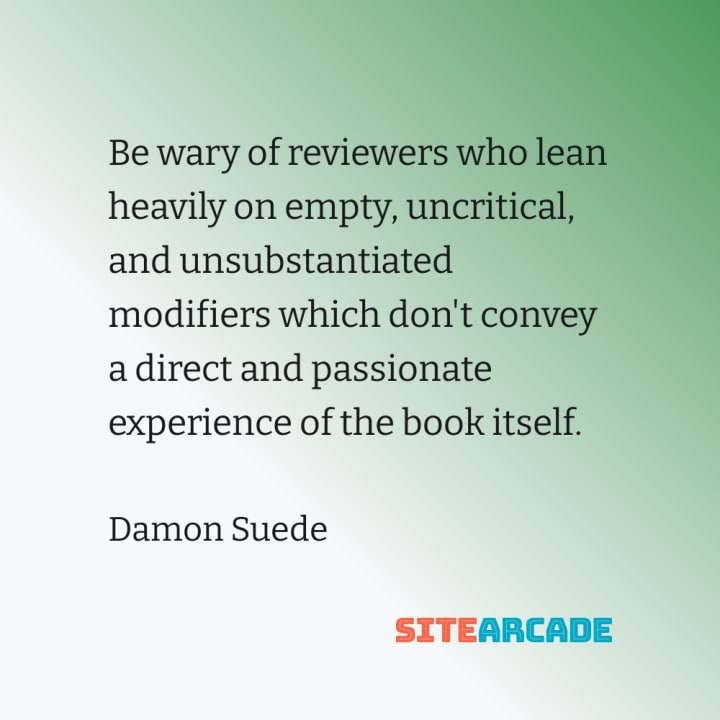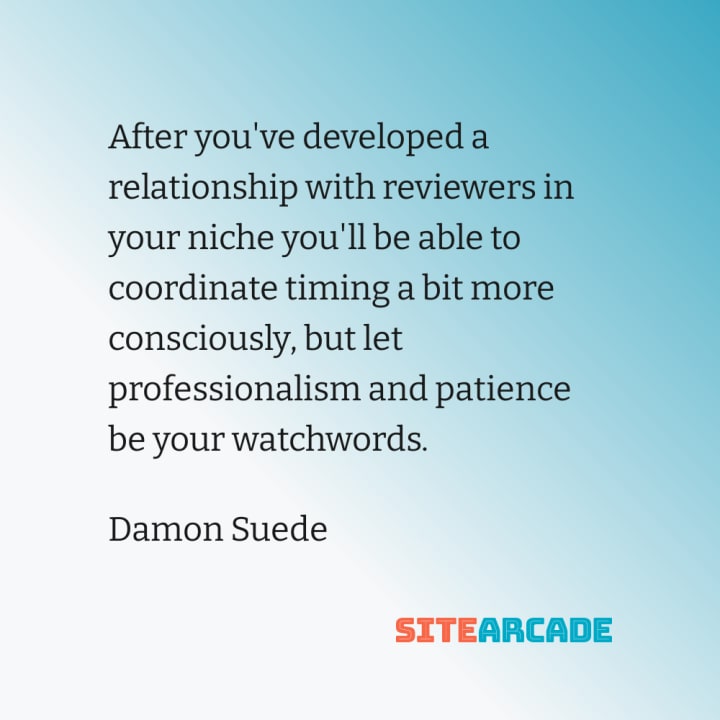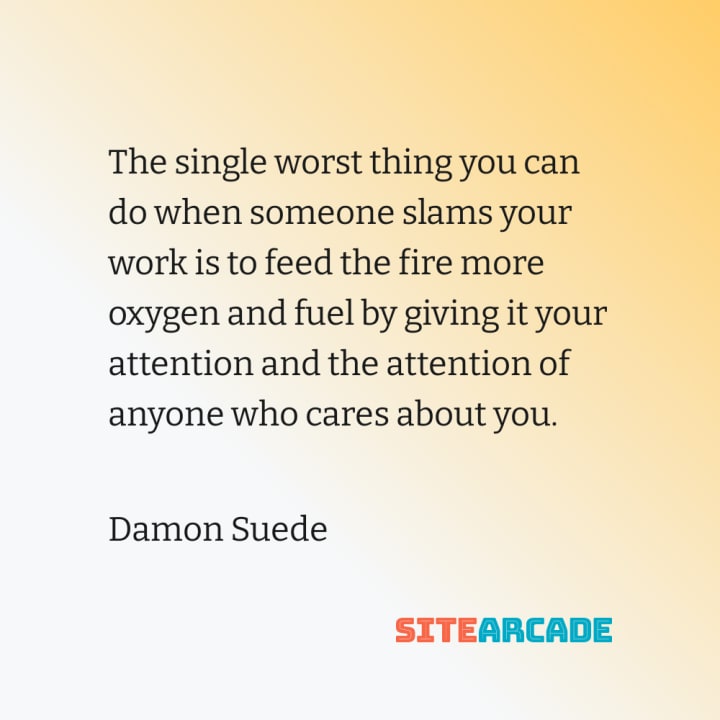The Art of Asking for Constructive Criticism
This week I thought I’d talk about the process of soliciting reviews. As periodicals have begun to falter and media noise begun to outweigh signal, the power of reviews is shifting. The online vendor economy encourages every consumer to rank a title and lard those stars with opinions about a book’s relative value. That’s a great and terrible both, but it means that the only thing worse than a negative review is no review at all. Every author and publisher has to develop a healthy professional relationship with reviewers who know how to do their job right.
Because I tend to approach all professional tasks as if planning the assassination of a Claudian emperor, over the past 30 years in entertainment I’ve developed a proactive strategy which adapted to publishing with relative ease. Quite simply, with hundreds of books printed every day and thousands of blogs with shaky audience numbers you have to get smart about the reviews you seek out.
Aim is the Name of the Game
Not every book is for every reviewer
Scattershot solicitation is for dummies unless you have all the money and all the time in the world. You can’t reach everyone and most wouldn’t want you if you did. Make a list of people who review often and constructively in your stretch of the bookshelf. That does not always have to mean the “top reviewers” or big-name journalists and bloggers.
Target the right people
Please investigate enough to know that the title you’re submitting is something that interests them. If a reviewer loathes your subgenre, don’t take it upon yourself to change their mind with your little bundle of joy. You won’t. Remember: their cup of tea is also their audience’s cup of tea. That’s how media (and popular attention) works. People seek out stuff that matters to them and ignore what doesn’t. If they avoid your work, so will their readers. This is why blind, wide cast submission is such a ridiculous strategy. Blogs and periodicals tend to be very frank about what interests them and if you fall outside their wheelhouse, hammering them with requests and promo will not change their minds.
Always look for a track record in your potential reviewers
Make sure they’re still actively reviewing in this neck of the bookish woods. Some people fall in love with a single author or a single series. Whatever rhapsodies result are not an indication that they are career critics. Never underestimate the power of a track record. What you want is reviewers with an affectionate and expansive understanding of your niche so that they can let fellow fans know why your book is a must-read addition to this stretch of the genre bookshelf.
Know your book’s hook
What story are you selling? Make the most of the various snazzy points of reader access that might be appropriate to emphasize to different venues. If you’re writing a kinky small-town romance with the cowboy and a cozy mystery subplot then you may be able to target cowboy readers, cozy readers, BDSM aficionados, and nostalgia addicts. Your book waits nestled in that Venn diagram sweet spot, but your potential readers may be hunting for books in very different corners of the internet. Even better by featuring your book those venues may expand their audience as well. Help them help you.
Word of mouth sells books and that means folks need something to talk about. Remarkable books inspire remarks.
Building Your List of Reviewers
As you’re building your list of regular reviewers, nowhere is a great place to start. Even baby bloggers grow up. Tiny magazines can become empires. If you find a smart, canny, passionate reviewer who really picks up what you’re laying down then cultivate them over the course of your career. They will respect you respecting them and afford you the same courtesy. By the same token when people show you who they are believe them. Unprofessionalism, rudeness, and negativity are incontrovertible red flags. Pay attention.
If you were blown away by a specific review, let them know. They wrote that piece of criticism and every writer appreciates appreciation. Be specific in your praise and convey the meaningful details that made you think they’d grok your work. Be wary of reviewers who lean heavily on empty, uncritical, and unsubstantiated modifiers which don’t convey a direct and passionate experience of the book itself. Readers can spot fluffing and fakery at forty paces.
Over time, you’ll build an active list of people who review in this particular subgenre space. Check out Amazon, BookBub, Goodreads, Fresh Fiction, IndieView, and category specific websites to see what specific people dig and champion the kind of work you’re producing. If you have a relationship with certain bloggers or print outlets that can often open a conversation in a way that elevates your title above the general slush pile of review requests. Querying thoughtful and passionate reviewers as your career evolves will build you a useful media listyou can tap every time you have a rollout. That works both ways: mutual respect is the name of the game and once reviewers grok that you’re their cup of tea, they’ll be psyched to get access to ARCs early.

On that tip, always offer to provide your book in whatever format the reviewer expects whether that is a digital or print copy. Boosting your signal shouldn’t cost them; that copy is the only compensation they’ll get besides possible platform development. If you are soliciting the review, you need to provide the desired format; that’s just a baseline. If supplying print copies to all and sundry is prohibitive, then learn to prioritize where that money gets spent and those copies get sent. Even e-books have a cost, but you aren’t going to just scatter free ARCs willy-nilly. To be honest there are too many books released every day to risk throwing up silly unprofessional roadblocks between your work and the desired coverage.
When approaching any reviewer, make certain they actually READ. Be you ware of reviewers who simply repurpose blurb language with fluffy adjectives for generic raves. Book buyers are rightly skeptical of anything that smacks of mushy, vague, or generalized superlatives in the resultant post. There is no point in spending all this time getting a pile of reviews that look like empty blathery nonsense.
The most important thing is for the resultant review to convey meaningful and specific details which will help your book connect with the right readers. Praise is great. Complements feel nice. But when was the last time you bought a book just because it was hot-good-nice-fun-easy…insert adjective. This is one of the reasons that negative reviews can often sell books better than bland hype: they get down into the nitty-gritty in ways that move people. The details convey what matters, and the emotional resonance an audience craves.
Bottom line: seek emotionally significant specifics and the people who provide them.
Always Keep It Professional and Positive
In all your review requests, please avoid negativity and hostility. For one thing, you have no idea who and what this person knows intimately and you could be digging a trap you’ll fall into later. More importantly arrogance and abusive language shunt your request into the 10-foot-pole category, as in “not with a.” Negatives undermine, positives underline.
Housekeeping matters. Make sure that in your approach you use friendly, professional language free of grammatical errors, spelling mistakes, and anything that smacks of begging, bullying, or boasting. If you cannot write an email, then your book is immediately suspect. People are too busy to waste time on iffy title from a crazy author they’ve never heard of.
Every detail of your approach should reassure them of your steady, sturdy competence within the genre. You will inevitably have set language that gets pasted into every email but verify that the formatting does not betray this cut-n-paste practicality. Personalize your approach whenever possible; “to whom it may concern” emails automatically slide to the bottom of the pile because they signal you don’t care, so why should they?

Once a reviewer agrees to take a look at the book, their schedule is their own. Please do not harass or pester someone trying to help you by demanding they reorganize their schedule to accommodate your need for attention. They may not get to your book for ages and that’s okay. The era of big launches and pivotal press coverage in genre publishing is largely gone. What reviews do is boost a books presence for the longtail sales that steady a career. You’d rather they think fondly of your book, then regret having agreed to saddle themselves with it. Again, after you’ve developed a relationship with reviewers in your niche you’ll be able to coordinate timing a bit more consciously, but let professionalism and patience be your watchwords.
Don’t forget the follow-through. Every reviewer appreciates a thank you note/
Never Feed Negativity
When it comes to scathing or hostile reviews, a word of advice: don’t feed the trolls. Reviews are not always raves and at times inappropriate to the point of abuse. That is none of your business. The single worst thing you can do when someone slams your work is to feed the fire more oxygen and fuel by giving it your attention and the attention of anyone who cares about you. Of such silliness are social media flame outs and meltdowns minted. Please let it go. Focus on the positives. Stay gracious and patient even when it gets ugly. Nine times out of ten, an abusive review means you picked the wrong person and got your knuckles wrapped for not doing your homework. Learn to do your due diligence more diligently the next time around.
Think of your books as teenagers: young, arrogant, foolish, reckless. I always say when your books leave home they’re out on the town, getting loaded, riding around in cars with crazed delinquents. You can’t control all the misbehavior around them. All you can do is love them while they’re yours and trust them to make the right decisions. Learn to let books lead their own lives. What other people think of you is none of your business.

That said, if the same negative reaction turns up more than thrice, take note, learn the lesson, and up your game next time. Occasionally, criticism is constructive.
By all means encourage newsletter subscribers, book clubs, betas, street teams, and super fans for honest evaluations of your output. At the same time, never ask for guaranteed raves or expect slavish adoration of anything you produce. Not only do uncritical reviews seem immediately suspect, but the lack of specificity or concrete criticism flags them as not worth anyone’s attention. A little sand in the oil can actually do a better job selling than blind hype. When I ask people to review anything, fiction or nonfiction I always ask folks to be honest, authentic, and to include one specific detail that moved them. What you want is people who are genuinely passionate about the work you’ve produced.
Most importantly, if you want people to pay attention to your work pay attention to theirs. Learn where you can find fascinating and inspiring criticism that actually moves the genre forward. Ask your readers where they look for interesting opinions and recommendations. Read widely and deeply across the genre so that we can all move genre fiction into the future. CRAFT MATTERS! Make each book better, bolder, brighter, braver. Kick your own butt before any review can.
Great reviews can launch a title, but only if your books can take the heat.